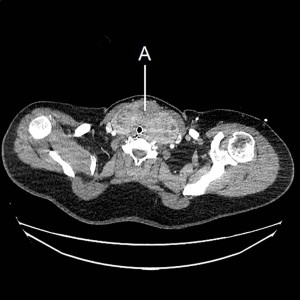 • The BMJ has just published the first of a new breed of articles in the education section, namely in endgames. This new type of article is called Spot Diagnosis, and it consists of a single image that is characteristic of a specific condition, and which is accompanied by a short vignette. The first one is on compressive cervical goitre and the authors are based in Kettering General Hospital, in the UK.
• The BMJ has just published the first of a new breed of articles in the education section, namely in endgames. This new type of article is called Spot Diagnosis, and it consists of a single image that is characteristic of a specific condition, and which is accompanied by a short vignette. The first one is on compressive cervical goitre and the authors are based in Kettering General Hospital, in the UK.
If you are potentially interested in writing a Spot Diagnosis for endgames, we’d be delighted to hear from you. The guidelines on how to write a Spot Diagnosis can be found in our instructions for authors.
• If the difference between statistical and clinical significance is not completely clear to you, read on. The latest endgames Statistical Question explains that the two expressions are often confused and used interchangeably, even though it is not necessarily possible—in trial results, for example—to infer clinical significance from statistical significance, and vice versa.
 • A recent research paper reports the frequency and severity of adverse events incurred by healthy volunteers in phase I trials of new drugs through the analysis of a large dataset from Pharma giant Pfizer. Even though the frequency of mild to moderate toxicities does not seem to differ from that of participants receiving placebo, and no participants died or developed permanent disability during the study period, around 1.5 in 1000 participants experienced serious adverse events.
• A recent research paper reports the frequency and severity of adverse events incurred by healthy volunteers in phase I trials of new drugs through the analysis of a large dataset from Pharma giant Pfizer. Even though the frequency of mild to moderate toxicities does not seem to differ from that of participants receiving placebo, and no participants died or developed permanent disability during the study period, around 1.5 in 1000 participants experienced serious adverse events.
The editorialist Jonathan Kimmelman considers that, overall, the findings of the aforementioned study are reassuring, but he warns that researchers continue to face significant barriers trying to access this kind of important evidence.
• We should all periodically “unplug” from our smartphones and tablets, says Richard Graham, a child and adolescent psychiatrist, in a blog. The UK celebrated its first National Unplugging Day yesterday, and if you’re based outside the UK, I hope you had a chance to unplug too.
Tiago Villanueva is assistant editor, The BMJ.